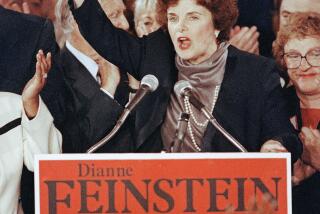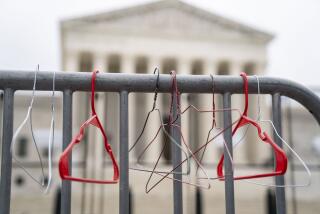Deukmejian Names Six as Supreme Court Candidates
- Share via
SACRAMENTO — Gov. George Deukmejian on Saturday named six judges, including a woman and a Latino, as his candidates to fill an upcoming vacancy on the California Supreme Court.
Deukmejian, who has repeatedly pledged to appoint judges who are tough on crime, selected five state appellate justices and a federal district judge as possible successors to Justice Otto Kaus, who is retiring this fall.
“I believe these six individuals represent an exceptionally qualified field of candidates for the state’s highest court,” Deukmejian said. “Perhaps most important, they understand the need for common sense justice as intended by the law. They recognize that the essential purpose of our criminal justice system is to protect peaceful law-abiding citizens from crime and violence.”
The governor’s list includes two judges from Los Angeles County, Justice John A. Arguelles of the state Court of Appeal, a Latino, and U.S. District Judge Pamela Ann Rymer, the only woman in the group.
The governor also chose Edward A. Panelli, who is presiding justice of the Court of Appeal in San Jose. As attorney general, Deukmejian blocked Panelli’s appointment in 1982 to the appellate court, but then appointed him to the post after becoming governor.
Deukmejian also selected appellate Justices Marcus M. Kaufman of San Bernardino, Hollis G. Best of Fresno and James B. Scott of San Francisco.
After submitting all of the names to the California Bar for its evaluation, Deukmejian will appoint one of the six to replace Kaus.
All of the finalists have at least 20 years of legal and judicial experience and were selected from “dozens of distinguished potential candidates,” Deukmejian said.
Deukmejian spokesman Kevin Brett said: “They are highly qualified people from a variety of backgrounds but they share one common characteristic: a high concern for public safety.”
Early Reagan Nominees
All five appellate justices received key judicial appointments from Gov. Reagan between 1969 and 1974. Reagan, as President, appointed Rymer to the federal bench in 1983.
Deukmejian, who had kept a tight lid on the names he had under consideration, made the announcement of his candidates in his weekly Saturday morning radio broadcast.
“I have said on a number of occasions that one of the main reasons I wanted to be governor was to have the opportunity to appoint new judges to the bench,” Deukmejian said. “I believe this is one of the most significant contributions I can make to my lifelong goal of improving public safety in California.”
Kaus announced last month that he would resign, citing as one reason the increasingly harsh attacks on the court by conservatives seeking to unseat Chief Justice Rose Elizabeth Bird and other liberal justices.
Deukmejian is among those attempting to oust Bird when she faces confirmation in the 1986 general election.
Preferences Visible
Deukmejian’s list of candidates for Kaus’ seat offers a preview of the kind of court the governor would create if given the opportunity. Brett, his spokesman, said that after Deukmejian makes his choice for the Kaus seat, the remaining five judges would be among candidates to be considered later for other vacancies.
“The governor wanted the public to be aware of the kind of people he has under consideration,” Brett said. “These are the kinds of people that the governor will continue to consider during the course of his governorship.”
Kaus’ replacement must be confirmed by a panel made up of Bird, Atty. Gen. John Van de Kamp and Senior Presiding Appeal Court Justice Lester Roth. The new justice would then be subject to confirmation on next year’s ballot.
In his radio broadcast, Deukmejian continued his attack on the Bird camp, which maintains that the campaign to unseat the chief justice will improperly politicize the court.
Cites Public’s Rights
Deukmejian countered, “The right of the people to vote on the conduct, the approach and the philosophy of all three branches of government must never be tampered with.”
Of the six finalists, Rymer, 44, has the least judicial experience. Before her appointment to the federal bench in 1983, she practiced law in Los Angeles County, specializing in antitrust and business litigation.
Last year, she presided over the trial of George Gwaltney, a former California Highway Patrol officer who was convicted in the rape and murder of a young woman he had stopped in the desert outside Barstow.
Rymer sentenced Gwaltney to the maximum term of 90 years in prison and then, in a highly emotional scene, invited the parents of the young victim into her chambers to express her sympathy.
A Republican, Rymer has conservative credentials dating back to 1964, when she was director of political research and analysis for Arizona Sen. Barry Goldwater’s presidential campaign.
Montebello Democrat
Arguelles, 58, served as a Superior Court judge from 1969 to 1984, when he was elevated to the 2nd District Court of Appeal by Deukmejian.
A Democrat, he was a Montebello city councilman in 1962 and 1963 until he was appointed to the Municipal Court bench by Gov. Edmund G. (Pat) Brown. Before that he served as a lobbyist in Sacramento for the Pacific Coast Quarter Horse Racing Assn. and other clients.
Panelli, 57, was first named to the Superior Court by Reagan in 1972. Gov. Edmund G. Brown Jr. sought to promote Panelli to the appellate court but Deukmejian blocked the appointment in a dispute over Brown’s attempt to name several judges before leaving office.
However, in 1983, Deukmejian named Panelli to the appeals court and in 1984 named him presiding judge of the San Jose appellate court.
Panelli is highly regarded by liberals and conservatives alike and was rated “exceptionally well qualified” to serve on the appellate bench by a California Bar committee. He lists no party affiliation, the governor’s office said.
Constitutional Ruling
Scott, 57, a former Sunnyvale city councilman, was first appointed to the Municipal Court bench by Pat Brown in 1963 and was elevated to the appeals court by Reagan in 1974.
In one of Scott’s most notable cases, he wrote a majority opinion in 1979 upholding the constitutionality of a law cutting off Medi-Cal payments for abortion. The state Supreme Court reversed the decision in 1981.
Scott also is a critic of the high court’s practice of “depublishing” Court of Appeal opinions with which it disagrees. Lower court opinions that are depublished cannot be cited as precedents and the practice has been criticized as a form of censorship by the high court.
Scott went so far as to write an unprecedented opinion critical of the process. The high court responded by depublishing that opinion.
Kaufman, 56, was appointed to the appellate court by Reagan in 1969 after practicing law for more than a decade.
In one of the more controversial divorce cases of the decade, Kaufman wrote in a concurring opinion that a woman who helped put her husband through medical school did not deserve to share in his income after their divorce.
Best, 59, a Republican, practiced law from 1953 until his appointment as a Superior Court judge in 1972. He was elevated to the appellate court by Deukmejian in October.
Times staff writer Dan Morain in San Francisco contributed to this story.
More to Read
Get the L.A. Times Politics newsletter
Deeply reported insights into legislation, politics and policy from Sacramento, Washington and beyond. In your inbox twice per week.
You may occasionally receive promotional content from the Los Angeles Times.










